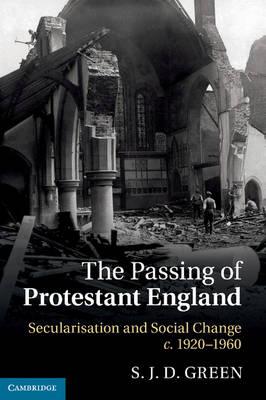ACCH Quarterly Vol. 18, No. 1, March 2012
Review of S. J. D. Green, The Passing of Protestant England: Secularisation and Social Change, c. 1920-1960 (Cambridge: Cambridge University Press, 2011), 333 Pp., ISBN 978-0-521-83977-8.
By Andrew Chandler, George Bell Institute, University of Chichester
 Very possibly what has brought many historians to consider seriously twentieth century religion is not its significance in politics, intellectual and cultural life or social existence, but the idea of its decline and even extinction. At all events, secularisation has by now become an academic realm in its own right, with its prophetic presences, its own points of reference, its particular questions (and answers) and its earnest debates about conceptual approaches and forms of analysis. Every scholar of contemporary society knows that in a western European country the statistics of adherence have crumbled, values and attitudes have altered and church buildings have emptied, shut and disappeared. Something vast has occurred—and we remain caught up in it. Whatever it may be, the term ‘secularisation’ still does very adequately in framing it.
Very possibly what has brought many historians to consider seriously twentieth century religion is not its significance in politics, intellectual and cultural life or social existence, but the idea of its decline and even extinction. At all events, secularisation has by now become an academic realm in its own right, with its prophetic presences, its own points of reference, its particular questions (and answers) and its earnest debates about conceptual approaches and forms of analysis. Every scholar of contemporary society knows that in a western European country the statistics of adherence have crumbled, values and attitudes have altered and church buildings have emptied, shut and disappeared. Something vast has occurred—and we remain caught up in it. Whatever it may be, the term ‘secularisation’ still does very adequately in framing it.
S. J. D.Dixonis based at that most privileged of Oxbridge bastions, All Soul’s College. Certainly he works with a very well-stocked library on his doorstep: his references are copious at every turn and, although there is little archival research going on here, there is a committed and valuable exploration of published primary material. The book represents not so much a coherent argument as a succession of specific explorations of the waning of a Protestant inheritance, most of it effectively Victorian. It is a gathered contribution, a garnering of past articles published by earlier collections. But it professes an overall argument, too.
Green is cagey with his terms at the outset—he refuses to define ‘religious phenomena’, and accepts that his book is, ‘unashamedly’, a study of the specifics of denominational practice and popular belief (3). His chronological frame is chosen with a purpose and to effect: for some time scholars of secularisation have insisted that what happened after 1960 marked the crucial sea-change in the fortunes of public religion. He is firmly conscious of the difficulties in persisting in the idea of something distinctively ‘English’, but resolute in keeping out the Scots and the Welsh. Part I presents an ‘outline of the problem’ combining dense historiography with a bash at narrative; Part II picks up some case studies, inspecting the world of Dean Inge, the ‘strange death of puritan England’ and the ‘discovery of a “post-Protestant” people’ by Seebohm Rowntree; Part III adopts the pleasantly alliterative form of ‘Resistance, revival and resignation’, examining the church-state debates over the 1944 Education Act, asking if there really was much of a religious revival in the 1950s and then ‘slouching towards a secular society’ in the early 1960s. All of this is characterised by tremendous confidence, subtlety and fluency in the mobilization of terms and interpretive frameworks. Does the whole odyssey cohere? Just about, probably. Every reader will have their own questions. Is there too little sense of the deliberately constructed denominationalism on which so many Christians placed their hopes in this period? Very possibly. (Incidentally, principled Baptists might not much enjoy finding themselves a part of some conglomerate called here, a little casually, ‘theBaptistChurch’.) Might far more be said about the fate of all kinds of Christian social and educational institutions in these years? Surely. Does Dean Inge really deserve so much house space? Could there have been more about someone like Ernest Barker who wrote so thoughtfully and extensively about comparable themes? It is too easy to regret what has been left to one side—and, perhaps, irrelevant, because much of the value of the book lies in its capacity to provoke the mind to think of other avenues.
A plaudit on the cover observes the author’s pessimism while a second congratulates him for being so very ‘sensible’. Green would surely know how to value both attributes. Almost at the last gasp he writes, ‘Religion will not disappear, not even inEngland. But the social significance of religion will go on declining.’ (316) How we grasp quite what that leaves behind would make an interesting chapter in itself. At all events, it would take a rash scholar indeed to deny the force of such a judgement today.
